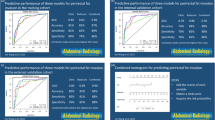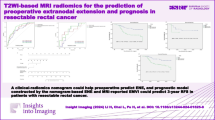Abstract
Purpose
To develop and validate a nomogram for the preoperative diagnosis of T2 and T3 stage rectal cancer using MRI radiomics features of mesorectal fat.
Methods
The data of 288 patients with T2 and T3 stage rectal cancer were retrospectively collected. Radiomics features were extracted from the lesion region of interest (ROI) in the MRI high-resolution T2WI, apparent diffusion coefficient (ADC), and diffusion-weighted imaging (DWI) sequences. After using ICC inter-group consistency analysis and Pearson correlation analysis to reduce dimensions, LASSO regression analysis was performed to select features and calculate Rad-score for each sequence. Then, Combined_Radscore and nomogram were constructed based on the LASSO-selected features and clinical data for each sequence. Receiver operating characteristic curve (ROC) area under the curve (AUC) was used to evaluate the performance of the Rad-score model and nomogram. Decision curve analysis (DCA) was performed to evaluate the clinical usability of the radiomics nomogram, which were combined with calibration curves to evaluate the prediction accuracy.
Results
The nomogram based on MRI-report T status and Combined_Radscore achieved AUCs of 0.921 and 0.889 in the training and validation cohorts, respectively.
Conclusion
The nomogram can be stated that the radiomics nomogram based on multi-sequence MRI imaging of the mesorectal fat has excellent diagnosing performance for preoperative differentiation of T2 and T3 stage rectal cancer.








Similar content being viewed by others
References
Papaccio F, Roselló S, Huerta M, et al. Neoadjuvant Chemotherapy in Locally Advanced Rectal Cancer. Cancers (Basel). 2020 Dec 3;12(12):3611.
Horvat N, Carlos Tavares Rocha C, Clemente Oliveira B, et al. MRI of Rectal Cancer: Tumor Staging, Imaging Techniques, and Management. Radiographics. 2019 Mar-Apr;39(2):367-387.
Qian Pei, Yi Xiaoping, Chen Chen, et al. Pre-treatment CT-based radiomics nomogram for predicting microsatellite instability status in colorectal cancer. European Radiology, 2022, 32(1): 714-724.
Zhang S, Yu M, Chen D, et al. Role of MRI-based radiomics in locally advanced rectal cancer (Review). Oncol Rep. 2022 Feb;47(2):34.
Yang Song, Zhang Jing, Zhang Yu-dong, et al. FeAture Explorer (FAE): A tool for developing and comparing radiomics models. PLOS ONE, 2020, 15(8): e237587.
Jian Zhao, Wei Zhang, Yuan Yi Zhu, et al. Development and Validation of Noninvasive MRI-Based Signature for Preoperative Prediction of Early Recurrence in Perihilar Cholangiocarcinoma. JMRI,2022,55(3),787-802.
Tian G, Fang H, Liu Z, Tan M. Regularized (bridge) logistic regression for variable selection based on ROC criterion. Stat Interface 2009;2(4):493-502.
Lanqing Yang, Liu Dan, Fang Xin, et al. Rectal cancer: can T2WI histogram of the primary tumor help predict the existence of lymph node metastasis?. European Radiology, 2019, 29(12): 6469-6476.
Mariana-M Chaves, Donato Henrique, Campos Nuno, et al. Interobserver variability in MRI measurements of mesorectal invasion depth in rectal cancer. Abdominal Radiology, 2022, 47(3): 907-914.
Lu H, Yuan Y, Zhou Z, et al. Assessment of MRI-Based Radiomics in Preoperative T Staging of Rectal Cancer: Comparison between Minimum and Maximum Delineation Methods. Biomed Res Int. 2021 Jul 10;2021:5566885.
Hou M, Zhou L, Sun J. Deep-learning-based 3D super-resolution MRI radiomics model: superior predictive performance in preoperative T-staging of rectal cancer. Eur Radiol. 2023 Jan;33(1):1-10.
B Zhao, Gabriel R-A, Vaida F, et al. Using machine learning to construct nomograms for patients with metastatic colon cancer. Colorectal Disease, 2020, 22(8): 914-922.
H Tibermacine, Rouanet P, Sbarra M, et al. Radiomics modelling in rectal cancer to predict disease-free survival: evaluation of different approaches. British Journal of Surgery, 2021, 108(10): 1243-1250.
Mou Li, Jin Yu-Mei, Zhang Yong-Chang, et al. Radiomics for predicting perineural invasion status in rectal cancer. World Journal of Gastroenterology, 2021, 27(33): 5610-5621.
Alfonso Reginelli, Nardone Valerio, Giacobbe Giuliana, et al. Radiomics as a New Frontier of Imaging for Cancer Prognosis: A Narrative Review. Diagnostics, 2021, 11(10): 1796.
Francesca Coppola, Giannini Valentina, Gabelloni Michela, et al. Radiomics and Magnetic Resonance Imaging of Rectal Cancer: From Engineering to Clinical Practice. Diagnostics, 2021, 11(5): 756.
Gaoxian Li, Cheng Xu, Jialiang Ren. Preoperative T stage determination of rectal cancer based on high-resolution T2WI Radiomics. Chinese medical imaging technology,2019, 35(08): 1224-1228.
Jian-Dong Yin, Song Li-Rong, Lu He-Cheng, et al. Prediction of different stages of rectal cancer: Texture analysis based on diffusion-weighted images and apparent diffusion coefficient maps. World Journal of Gastroenterology, 2020, 26(17): 2082-2096.
Xue Lin, Zhao Sheng, Jiang Huijie, et al. A radiomics-based nomogram for preoperative T staging prediction of rectal cancer. Abdominal Radiology, 2021, 46(10): 4525-4535.
Vetri-Sudar Jayaprakasam, Paroder Viktoriya, Gibbs Peter, et al. MRI radiomics features of mesorectal fat can predict response to neoadjuvant chemoradiation therapy and tumor recurrence in patients with locally advanced rectal cancer. European Radiology, 2022, 32(2): 971-980.
Hiram-Shaish H, Andrew-Aukerman, Rami-Vanguri, et al. Radiomics of MRI for pretreatment prediction of pathologic complete response, tumor regression grade, and neoadjuvant rectal score in patients with locally advanced rectal cancer undergoing neoadjuvant chemoradiation: an international multicenter study. European radiology, 2020, (11): 6263-6273.
Ma X, Shen F, Jia Y, et al. MRI-based radiomics of rectal cancer: preoperative assessment of the pathological features. BMC Med Imaging. 2019 Nov 12;19(1):86.
Yin JD, Song LR, Lu HC, et al. Prediction of different stages of rectal cancer: Texture analysis based on diffusion-weighted images and apparent diffusion coefficient maps. World J Gastroenterol. 2020 May 7;26(17):2082-2096.
Surov A, Meyer HJ, Höhn AK, et al. Correlations between intravoxel incoherent motion (IVIM) parameters and histological findings in rectal cancer: preliminary results. Oncotarget. 2017 Mar 28;8(13):21974-21983.
Bo He, Ji Tao, Zhang Hong, et al. MRI‐based radiomics signature for tumor grading of rectal carcinoma using random forest model. Journal of Cellular Physiology, 2019, 234(11): 20501-20509.
Xiangchun Liu, Yang Qi, Zhang Chunyu, et al. Multiregional-Based Magnetic Resonance Imaging Radiomics Combined With Clinical Data Improves Efficacy in Predicting Lymph Node Metastasis of Rectal Cancer. Frontiers in Oncology, 2021, 10.
Pushpanjali Gupta, Chiang Sum-Fu, Sahoo Prasan-Kumar, et al. Prediction of Colon Cancer Stages and Survival Period with Machine Learning Approach. Cancers, 2019, 11(12): 2007.
Arnaldo Stanzione, Verde Francesco, Romeo Valeria, et al. Radiomics and machine learning applications in rectal cancer: Current update and future perspectives. World Journal of Gastroenterology, 2021, 27(32): 5306-5321.
Sergei Bedrikovetski, Dudi-Venkata Nagendra-N, Kroon Hidde-M, et al. Artificial intelligence for pre-operative lymph node staging in colorectal cancer: a systematic review and meta-analysis. BMC Cancer, 2021, 21(1).
Author information
Authors and Affiliations
Corresponding authors
Additional information
Publisher's Note
Springer Nature remains neutral with regard to jurisdictional claims in published maps and institutional affiliations.
Rights and permissions
Springer Nature or its licensor (e.g. a society or other partner) holds exclusive rights to this article under a publishing agreement with the author(s) or other rightsholder(s); author self-archiving of the accepted manuscript version of this article is solely governed by the terms of such publishing agreement and applicable law.
About this article
Cite this article
Deng, B., Wang, Q., Liu, Y. et al. A nomogram based on MRI radiomics features of mesorectal fat for diagnosing T2- and T3-stage rectal cancer. Abdom Radiol (2024). https://doi.org/10.1007/s00261-023-04164-w
Received:
Revised:
Accepted:
Published:
DOI: https://doi.org/10.1007/s00261-023-04164-w




